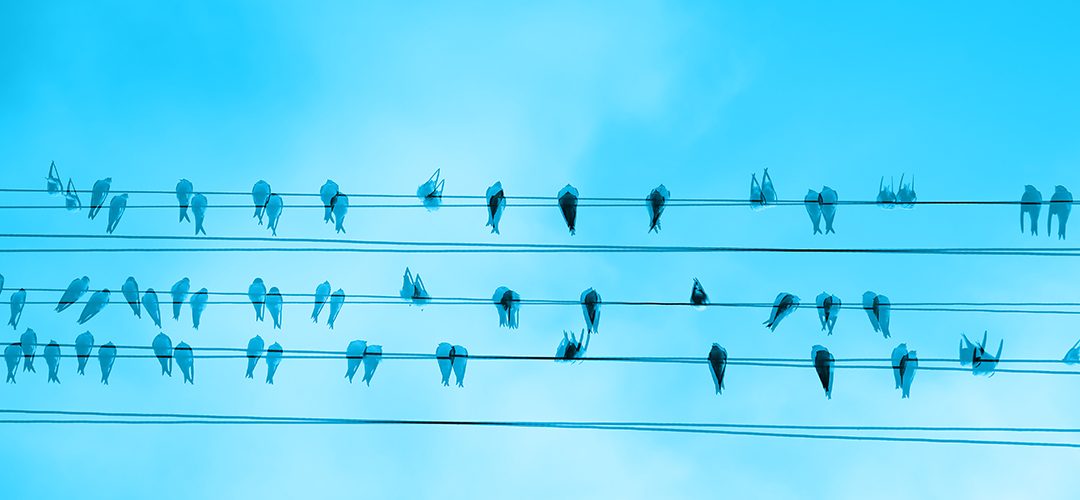Just like shoes with heels will change ones gait and the whole posture, social networks shape our thinking. I had the rare opportunity to do something quite trivial for the first time and watch exactly what it does to me: Twittering. A subjective report.
Like a bird on a wire
like a drunk in a midnight choir
I have tried in my way
to be free
Leonard Cohen.
Skydiving. Yoga. Snowboarding – when do you ever do something for the first time? When I decided that lively Twitter was the right social network for this blog (and not gossiping Facebook), I entered my personal #Neuland. My five year old account I had only used for sporadic reading and just kept my mouth shut for once.
Unlike many people, I never complained about poor quality content on Facebook. Maybe it’s because I have really nice, smart and interesting friends. Or that I’m always curious and royally happy about tiny things. One post I still find hilarious today is the video Thai Space Program, about a fantastic rocket carousel with a diameter of 10 m, which screws itself hundreds of meters high into the sky at a village festival in Thailand, accompanied by big cheers and even bigger smoke development. And then parachuted down! What a sublime, meaningless, meaningful, fun cultural achievement!
Sharing things like this just makes you happy. No point in sharing my dishes, Deutsche Bahn experiences or family moments with “all” friends. For my profession I have to know how the social media work, and doing some promotion for my band was of course a matter of honor. But now came something completely different.
Suddenly something was important to me (this blog) and I started to develop ambitions on Twitter. I found it surprisingly difficult to find followers, despite (or maybe because of) “important” content. To build reach in an interested peer group, on a topic that can be easily narrowed down. So I start to test: What is of interest, what is being liked, what is shared? And already the algorithm begins to shape me. Or is it the human psyche in the corset of the machine? The collective unconscious, the swarm intelligence, the world spirit?
In 2009, at the time of my first viral campaign, I had gotten to know Twitter as a sloppily programmed little tool that had obviously grown too fast for its creators. But it worked somehow, thanks to #Hashtag. Now I notice that the obscure algorithm has changed a lot since then. It feels better, more relevant than Facebook. Of course, I only see the global turmoil through a peephole. But the small contributions are so incredibly pointed, interlaced with tons of content and biographies, that I could withdraw all day to study them. Luckily, a little support by my foundation allows me to regard this as a kind of work.
Quickly I am on the hook. What follows must read like the experiences of a 12-year-old: Fascinated, I begin to participate. As if that would have any relevance with 10 followers – it’s more “for the record”, an exercise in curating content and a kind of diary. Who I follow here becomes a new who-is-who for me. I probe what Twitter thinks is important and how this relates to my views. You adapt, it’s hard to ignore – like the SEO plugin that gives me well-meant tips on how to write. You get a little cynical: Your own content doesn’t really resonate. On the other hand, the purely verbal statement for an atheist threatened by torture – in the high hope that the mass public may take a good influence – brings sympathies. After all, this is better than the opposite, but it is a weird kind of economy.
The opposite is also quickly there. All the hate is just a few clicks away. The phrase “Hate is not an opinion” I find quite difficult. But sometimes I think that seeing the Internet so constructive in the first years came due to the fact that all the imbecils hadn’t yet discovered it. Now, here they are. And I physically feel that the compulsory exercise of “leaving my filter bubble” (a logical contradiction?) is literally unhealthy. The Philippine “content moderators” who are supposed to clean hatred and violence out of the platforms, probably have shorter lives – like firefighters –, because dealing with the horror is so psychologically damaging.
The cultural competency of posting gives birth to attitudes for which one must constantly decide anew. Are you a snob, a dandy, a gourmet? Do you go to a pub to fight? Are you looking for pearls and spin threads with unknown people? Will the world change if you keep yourself out of this? Is @therealhabeck the same person as the green MoP @RobertHabeck, who said goodbye to Twitter because it makes him aggressive? Does this discourse machine bring constructive added value in the end?
For me, Twitter remains the means of choice – and the tweet the dosage form of entire worlds in a nutshell. To network myself, to develop a coherent position, to be a tangible and approachable person. Is it okay to show so much trust and goodwill to such a darn platform that you don’t even like very much? Maybe it’s like the rest of the world: it’s anything but perfect. And the laws in this strange street called Social Media, we should change them. Moving the algorithm away from sensation to more constructive things. Still a way to go, really.
<<
PS: Speaking of it, I am much in favor of forcing dominant social media platforms to provide open interfaces for sending and receiving posts via alternative platforms and messengers.

